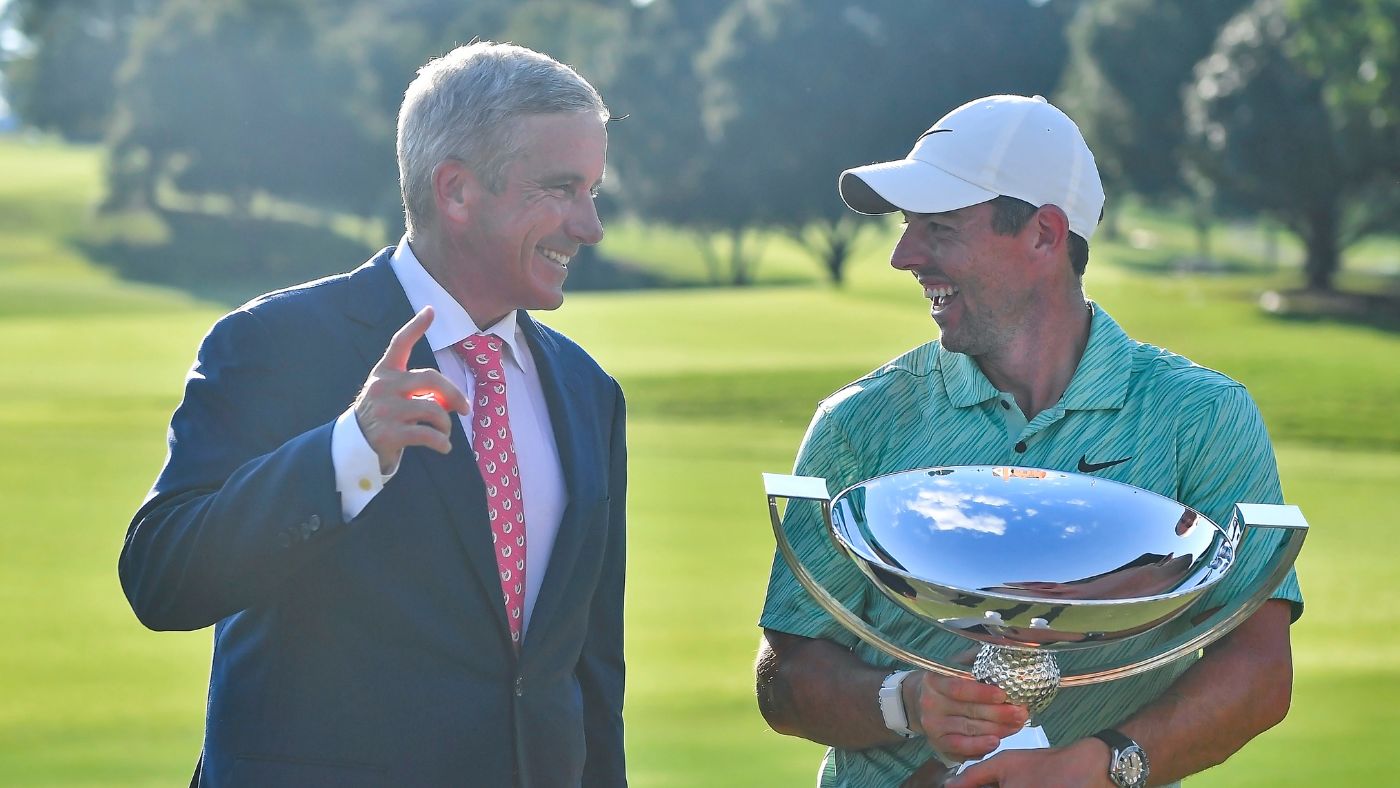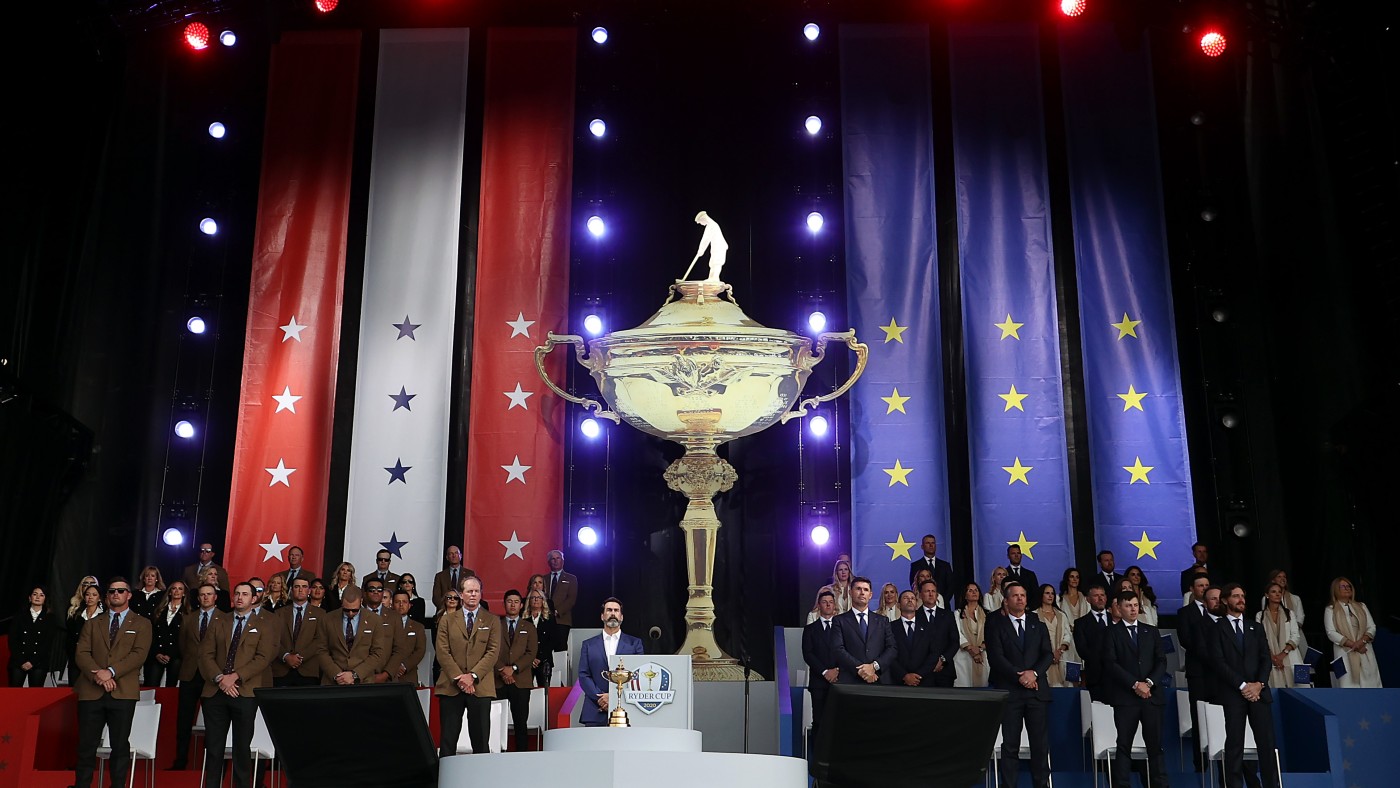PGA Tour-LIV shock merger: winners and losers from golf’s unification
Men’s golf tours declare peace after their civil war – but turmoil still lies ahead

A free daily email with the biggest news stories of the day – and the best features from TheWeek.com
You are now subscribed
Your newsletter sign-up was successful
It was an announcement that shocked the world of golf. After a bitter civil war, the PGA Tour, DP World Tour and the Saudi Arabia-backed LIV Golf series revealed yesterday that a “landmark agreement” had been reached to “unify the game of golf” on a “global basis”.
The parties have agreed that the “golf-related” commercial businesses and rights of the Saudi Public Investment Fund (PIF), including LIV Golf, will be “combined” with those of the PGA and DP World tours into a “new, collectively owned, for-profit entity”.
Following two years of “disruption and distraction”, this is “a historic day for the game we all know and love”, said Jay Monahan, commissioner of the PGA Tour. Keith Pelley, chief executive of the DP World Tour (formerly the European Tour), described it as a “momentous day”, while PIF governor Yasir Al-Rumayyan said the partnership “represents the best opportunity to extend and increase the impact of golf for all”.
The Week
Escape your echo chamber. Get the facts behind the news, plus analysis from multiple perspectives.

Sign up for The Week's Free Newsletters
From our morning news briefing to a weekly Good News Newsletter, get the best of The Week delivered directly to your inbox.
From our morning news briefing to a weekly Good News Newsletter, get the best of The Week delivered directly to your inbox.
Former US president Donald Trump, who has hosted LIV competitions at his golf courses, “hailed the deal” on his Truth Social platform, said the Financial Times. Trump posted that it was a “big, beautiful, and glamorous deal for the wonderful world of golf”.
How the golf pundits reacted
The formation of an “industry powerhouse” is “expected to transform the sport”, said Alan Blinder in The New York Times. It all “came together so quickly” that the new entity “does not yet even have a name”. However, it will be controlled by the PGA Tour and “significantly financed” by the PIF, the sovereign wealth fund chaired by Mohammed bin Salman, the Crown Prince of Saudi Arabia. Al-Rumayyan will be the new company’s chairman and Monahan will be CEO.
When yesterday’s email “dropped” it was like “reading an April Fools’ Day spoof”, said Iain Carter, the BBC’s golf correspondent. The notion of the established golf tours “harmoniously joining forces” with the “breakaway” LIV circuit was “so far-fetched”. While there is “now peace between rival factions”, there will “still be plenty of turmoil ahead”.
There are “plenty of questions left unanswered” following the announcement, which “rocked the sports world and the golf landscape”, said Kyle Porter on CBS Sports. In his 11 years of covering professional golf, “no single piece of news has been more shocking”.
A free daily email with the biggest news stories of the day – and the best features from TheWeek.com
With golf fans, pundits and officials still digesting the fallout of the shock merger, we break down the winners and losers from the sport’s unification.
Winners: the breakaway LIV players
When LIV Golf launched in 2022 it was able to “lure some of golf’s biggest names away” from the PGA Tour and DP World Tour by offering “staggering sums of money”, said Sky Sports. Stars who joined the breakaway included Phil Mickelson, Brooks Koepka, Dustin Johnson, Sergio Garcia and Ian Poulter. This year’s LIV schedule will “continue as planned”, but golfers who were “suspended indefinitely” by the PGA and DP World tours will be able to “re-apply for membership” from the end of the 2023 season.
Mickelson and the other LIV golfers “who got paid” are winners from the “blockbuster” deal, said Tim Crean on ClutchPoints. It seems as though all these players will come back to the “now-larger Tour” and “be able to compete as they had in the past”. The “only real difference” is that the superstars who jumped ship “are now nine figures richer”. Mickelson called it an “awesome day” on Twitter.
Losers: the loyal PGA players
“Stunned” PGA loyalists who “rejected lucrative paydays” to snub the Saudi-backed series “must be sick”, said Daniel Davis in the Daily Mail. Ultimately, “household names” opted to remain on the PGA Tour, “even in spite of the eye-watering packages” being tabled by LIV. Golf icon and 15-time major winner Tiger Woods turned down between $700 and $800m (£575m-£650m) to switch, according to LIV chief Greg Norman. Rory McIlroy is said to have declined £400m and Jon Rahm “waved away” £321m, Davis added.
McIlroy and Woods had “established themselves as the biggest supporters” of the PGA Tour in its battle with LIV Golf, said Sky Sports. However, “both were kept in the dark” about the stunning deal.
Winners: Saudi Arabia
The PGA’s merger with LIV “can’t be seen as anything other than a Saudi victory”, said Ewan Murray in The Guardian. “Forget the talk of released tension”, this deal is “merely a depressing illustration that money can disrupt and distort everything in sport”.
This victory for Saudi Arabia is “another sign that money can overwhelm almost any other force in sports”, said David Leonhardt in The New York Times. As part of the deal, the Saudi investment fund will “have the right of first refusal for future investments in the tour, allowing it to expand its stake”.

Losers: Jay Monahan and Greg Norman
PGA Tour boss Monahan accepts that he will be labelled a “hypocrite” as he had previously ruled out any merger. And after also admitting that players could be compensated for turning down millions to join LIV, Monahan is facing “calls to resign”, said Sky Sports. Following a “contentious” players’ meeting, Tour Advisory Council member Johnson Wagner revealed there were “many moments” where certain players were “calling for new leadership” of the PGA Tour and “even got a couple of standing ovations”.
Another official whose role is expected to be under threat is Greg Norman. The Australian has been a “divisive figurehead” as chief executive of LIV, but the former world No.1 “was not mentioned” during the official announcement, said Ben Collins on BBC Sport. In the 973-word statement, “none of these shocking words were Greg, or Norman”, Jacob Polychronis added on Fox Sports. Having fought a “bitter crusade” as the “frontman” of LIV for nearly two years, Norman’s omission was “curious”. “Chewed up” and “spat out”, he became a “pawn” in golf’s great war “and still lost”.
Winners: sportswashing
The term “sportswashing” means “the use of games and teams and stadiums to cleanse an image and launder a reputation”, said Jon Wertheim on CBS News. A country that has “never won an Olympic gold medal”, Saudi Arabia has “suddenly emerged as a major player in global sport” – hosting events, buying teams, and luring athletes with “staggering” contracts.
PIF already owns Premier League club Newcastle United and in recent years has “poured billions into one-off spectacles” for individual sports, said DJ Dunson on Deadspin. The impending golf merger has brought Saudi sportswashing efforts to an American pro sport and is their “boldest foothold into the American market yet”.
This is a “gigantic victory” for sportswashing, said Ben Freeman, a research fellow at the Quincy Institute for Responsible Statecraft. He told The Guardian that “in fact, it is the biggest sportswashing win that any authoritarian regime has ever had”. The PIF have “effectively bought the whole of international golf in one swoop”.
“Sportswashing works, kids,” said Murray in The Guardian. The cost of this chapter is to “the tune of several billion dollars”, which is “chump change” to the PIF.
Losers: human rights
The PGA Tour has rolled out a “blood-red carpet” for the Saudis and LIV Golf, said Dave Zirin on MSNBC. The tour and its commissioner have “suddenly decided to ignore all the negative implications” that he said would come with working with Saudi Arabia. As recently as Monday, the “official position” of the PGA Tour was that its competitor was a “scandalous, even odious, operation”, said Zirin. Referring to Saudi Arabia’s horrific human rights record, Monahan said last June: “You’d have to be living under a rock to not understand the implications of involving yourself with the Saudis.” Monahan’s “strong comment” is now “just a reminder that pencils have erasers”.
The Saudi-backed takeover of golf has been criticised as a “betrayal” by the group representing families of 9/11 victims. In a statement, 9/11 Families United said it was “shocked and deeply offended” by the merger, as Saudi operatives “played a role in the 9/11 terrorist attacks, and now it is bankrolling all of professional golf”. The PGA and Monahan “appear to have become just more paid Saudi shills”, the statement added. PGA Tour leaders should be “ashamed of their hypocrisy and greed” as it “appears their concern for our loved ones was merely window-dressing in their quest for money – it was never to honour the great game of golf”.

Winner or loser: Ryder Cup
A “big question” to come out of the merger is “how might selection be affected” for the European team for this September’s Ryder Cup in Rome, said Sky Sports. Players who had joined the LIV breakaway – including Ryder Cup stars Ian Poulter, Lee Westwood, Sergio Garcia and Henrik Stenson – are ineligible to play in this year’s event after resigning from the DP World Tour. There’s “only two criteria” to be a Ryder Cup player, DP World Tour chief Pelley told the broadcaster. “You have to be European and you have to be a DP World Tour member. If you’re not a DP World Tour member, you can’t play in the Ryder Cup.”
So, “as things stand”, it is “extremely unlikely” that any of the four will be eligible for this year’s matches in Italy, said John Huggan on GolfDigest. “Conversely”, American players who left for LIV “can still qualify despite being prohibited from playing in PGA Tour events based on still technically being members of the PGA of America”.
Mike Starling is the former digital features editor at The Week. He started his career in 2001 in Gloucestershire as a sports reporter and sub-editor and has held various roles as a writer and editor at news, travel and B2B publications. He has spoken at a number of sports business conferences and also worked as a consultant creating sports travel content for tourism boards. International experience includes spells living and working in Dubai, UAE; Brisbane, Australia; and Beirut, Lebanon.